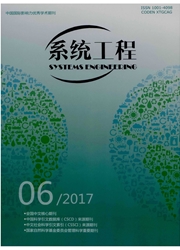

 中文摘要:
中文摘要:
基于最大效用理论的协商往往假设协商者完全理性,然而在现实的协商中,协商者的行为往往偏离理性,针对这一问题,将前景理论应用到辩论协商中,利用前景理论对不确定条件下协商者的决策行为进行探讨。利用知识库中的信息构造协商者相对收益或损失的参考点,同时利用外部信念模型对前景理论中的参考点进行动态移动,以动态反应协商者偏好的变化。通过算例验证了基于前景理论的辩论协商可以很好地反应协商者的决策行为,并能够帮助协商者顺利完成协商。
 英文摘要:
英文摘要:
Negotiation based on the maximum utility theory usually assumes that negotiators are completely rational. But during real negotiation, negotiators may deviate from rationality. In order to solve the problem, this paper introduces prospect theory to negotiation based on the argumentation and it discusses the negotiators' decision-making behavior under uncertain conditions based on prospect theory. Then it builds reference point of relative gains or losses with the information got from knowledge base, and moves the reference point dynamically according to external belief model to correspond with negotiators' decision-making attitude. The simulation example proves that argumentation-based negotiation based on prospect theory can reflect negotiators' decision-making behavior well and can promote negotiation proceeding successfully.
 同期刊论文项目
同期刊论文项目
 同项目期刊论文
同项目期刊论文
 期刊信息
期刊信息
